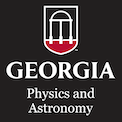Events Calendar View
-
CSP Lunch Seminar
Oct 5, 2010
Random number generators and SSE realization
-
Departmental Colloquium
Oct 7, 2010
The KEPLER Mission – A Search for Habitable Worlds
KEPLER is NASA’s first mission capable of finding earth-size worlds around other stars. Launched in March, 2009, KEPLER’s objective is to determine if other Earths exist in our galaxy and how many are there. The results of KEPLER will be profound – either Earth is a very rare planet, or earth-like planets are commonplace. The speaker, Roger Hunter (UGA ’78) is the NASA Project Manager for the KEPLER Mission. He leads a team of over 80 scientists and engineers on a mission that is expected to last at least 3 ½ years in search of another earth. The discussion will provide an overview of the KEPLER mission, its capabilities and characteristics, results to date, and mission expectations.
-
CSP Lunch Seminar
Oct 12, 2010
Thermodynamics of Magnetic Systems from First Principles
-
Departmental Colloquium
Oct 14, 2010
Chasing Shadows: Quasar Absorption Lines as Probes of Galaxy Evolution
The evolution of galaxies and the cosmic history of element production are fundamental themes in modern astrophysics and cosmology. However, the light emitted by distant galaxies is often too faint to allow detailed studies. Fortunately, a very sensitive technique to detect distant galaxies is by means of their "shadows" against the light of bright background sources such as quasars. Absorption lines in quasar spectra can be used to probe interstellar gas in galaxies at various stages of evolution, and thus provide powerful probes of the history of star formation and chemical enrichment in galaxies. Using this technique, we recently uncovered a "missing metals problem'' in low-redshift galaxies, i.e. a discrepancy between the observed amount of metals and the amount predicted by the chemical evolution models. On the other hand, we have recently discovered a new population of galaxies with very high levels of metals, including some that had reached several times the Sun's metallicity 7-10 billion years ago! What are these strange galaxies, and why did they get enriched so quickly? We will discuss clues emerging from our imaging/ spectroscopic observations that promise to shed light on several aspects of galaxy evolution.
-
Oct 15, 2010
Patent and Tech Transfer Primer
Guest: Drs. Christopher Linder, Gennaro Gama, Mr. Zameer Sheikh
Friday, October 15, 2010 4:00 pm - 5:00 pm
Location: Riverbend Research South Laboratory AuditoriumThe talk, presented by Drs Christopher Linder (Thomas Kayden), Gennaro Gama (UGARF) and Mr. Zameer Sheikh (UGARF) will provide the audience with a view of the patenting and licensing process, and of the need for specific agreements before collaboration with outside parties can commence and before materials (chemicals, biologic materials, data, etc.) can be shared in/out of the university.
-
Departmental Colloquium
Oct 21, 2010
Research Collaboration in Academic Sciences and Engineering: Findings from the National Survey of Academic Scientists
In three separate NSF-funded studies, Barry Bozeman and his colleagues at University of Georgia and Georgia Tech have been studying the social, behavioral and, now, the ethical aspects of research collaboration. The projects have involved multiple methods, including (1) survey research of a representative sample of science and engineering faculty in U.S. Carnegie Extensive universities (i.e. "Research I), n=2024, (2) data from curricula vitae, and analysis of co-authoring, (3) citations (both articles and patents) data from the SSI/Web of Sciences and (4) interviews. Studies have focused on: (1) numbers of collaborators and characteristics; (2) geographic and social proximity of collaborations, (3) roles of institutions in collaboration (especially university research centers); (4) collaboration and technology transfer between individual scientists and industry (i.e. the Bozeman Industry Involvement Scale); (5) collaboration by type of collaborator, especially graduate students; (6) relationship of collaboration to research productivity; (7) differences between men and women faculty with respect to collaboration patterns and criteria and strategies for developing criteria. The latest phase of the work, just beginning this month, focuses on power dynamics and ethical issues in collaboration, include "ghost authors." After a very brief review of the methods and chief findings of the projects, the presentation will focus on those aspects of collaboration of greatest interest to those attending the presentation.
Page 13 of 121, showing 6 records out of 723 total, starting on record 73, ending on 78


